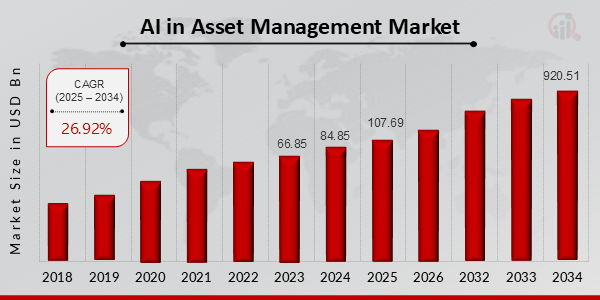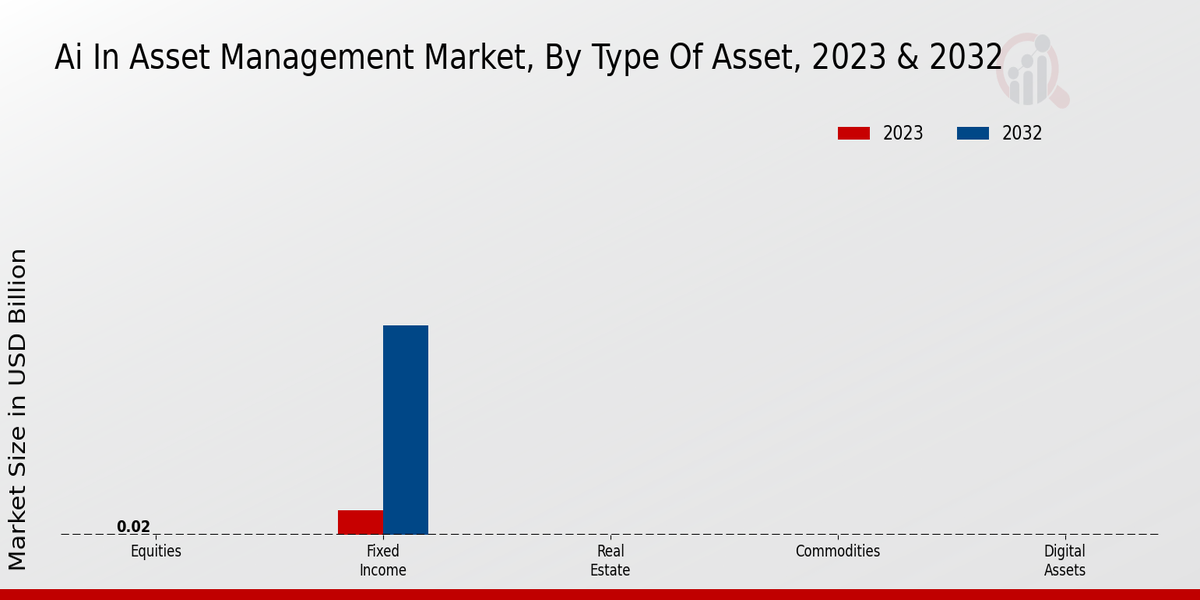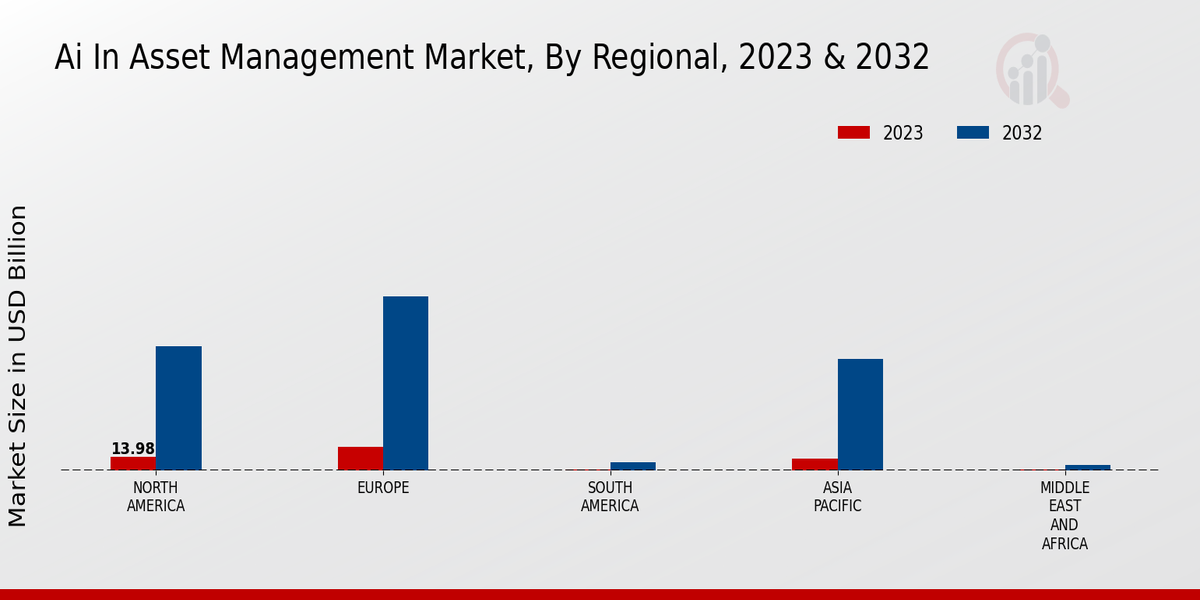AI in Asset Management Market Overview
AI in Asset Management Market is projected to grow from USD 107.69 Billion in 2025 to USD 920.51 Billion by 2034, exhibiting a compound annual growth rate (CAGR) of 26.92% during the forecast period (2025 - 2034). Additionally, the market size for AI in Asset Management Market was valued at USD 84.85 billion in 2024.
Key AI in Asset Management Market Trends Highlighted
The Global AI in Asset Management Market is driven by various factors, including increasing adoption of AI technologies, growing demand for personalized investment solutions, and the need for improved risk management. The market is expected to witness significant growth in the coming years due to the increasing availability of data and advancements in AI algorithms.
Key trends in the AI in Asset Management Market include the integration of AI into existing asset management systems, the development of new AI-powered investment strategies, and the use of AI for risk management and compliance. Opportunities in the market include the development of AI-powered solutions for specific asset classes and the expansion of AI into new geographic regions.
The market is highly competitive, with several established players and emerging startups offering AI-powered solutions for asset management. Key players in the market include BlackRock, Vanguard, Fidelity Investments, and Goldman Sachs.
Figure 1: AI in Asset Management Market Size, 2025-2034 (USD Billion)

Source: Primary Research, Secondary Research, MRFR Database and Analyst Review
AI in Asset Management Market Drivers
Growing Demand for Enhanced Decision-Making
The industry is currently experiencing a surge in the demand for advanced decision-making tools and techniques. Asset managers are increasingly using AI to analyze massive datasets, identify patterns and trends and make more informed investment decisions.
Due to the ability of AI algorithms to process complex data in real time, asset managers are provided with actionable insights that contribute to the optimization of portfolio performance. As a result, the increasing demand for enhanced decision-making is likely to drive the growth of the market over the forecast period.
Rising Adoption of Robo-Advisors
Global AI in Asset Management Market is witnessing a surge in robot-advisor adoption. Robo-advisors are automated investment platforms that utilize AI algorithms to offer tailored investment advice and portfolio management services.
They employ machine learning to design investment strategies that are tailored to the investor’s risk tolerance, financial ambitions, and time frame.
Robo-advisors have increased in popularity, making them an attractive investment option that is easy to implement and affordable.
Government Regulations and Compliance
The Global AI in the Asset Management Market is regulated and impacted by the changes in government stipulations. Regulatory bodies are now considering the deploying of AI in services related to the asset.
Laws and regulations are put in place to ensure that the AI to be deployed is responsible in use and ethical too. This will protect the investors, promote transparency in market and curb the risk using AI when making investment decisions at workplace.
All asset managers should comply with these regulations to remain in the market and maintain the trust of the investors/ customers.
AI in Asset Management Market Segment Insights
AI in Asset Management Market Type of Asset Insights
The Global AI in Asset Management Market is segmented by type of asset into equities, fixed income, real estate, commodities, and digital assets. Equities are a type of financial asset that represents ownership in a company.
They are traded on stock exchanges, and their value fluctuates based on the performance of the underlying company.
In 2023, the global equities market was valued at USD 120 trillion and is expected to grow to USD 180 trillion by 2030. Fixed income securities are a type of financial asset that provides a regular stream of income.
They include bonds, annuities, and certificates of deposit. In 2023, the global fixed-income market was valued at USD 150 trillion and is expected to grow to USD 200 trillion by 2030. Real estate is a type of physical asset that includes land, buildings, and other structures.
It is often used as an investment vehicle and its value is based on factors such as location, size, and condition. In 2023, the global real estate market was valued at USD 280 trillion and is expected to grow to USD 400 trillion by 2030. Commodities are raw materials that are used in the production of goods and services.
They include oil, gas, metals, and agricultural products. In 2023, the global commodities market was valued at USD 20 trillion and is expected to grow to USD 30 trillion by 2030.
Digital assets are a type of asset that exists in digital form. They include cryptocurrencies, non-fungible tokens, and other digital collectibles.
In 2023, the global digital assets market was valued at USD 1 trillion and is expected to grow to USD 10 trillion by 2030.
The type of asset segment is expected to grow significantly in the coming years, driven by factors such as the increasing adoption of artificial intelligence in asset management, the growing demand for alternative investments, and the increasing number of high-net-worth individuals and institutional investors.

Source: Primary Research, Secondary Research, MRFR Database and Analyst Review
AI in Asset Management Market Purpose of AI Insights
The Global AI in Asset Management Market is segmented based on Purpose of AI into portfolio optimization, risk management, performance enhancement, customer service, fraud detection.
Among these segments, portfolio optimization held the largest market share of around 23.6% in 2023 and is projected to reach USD 106.3 billion by 2032, growing at a CAGR of 27.2% during the forecast period.
The risk management segment is expected to grow at a CAGR of 26.5% during the forecast period and is projected to reach USD 98.7 billion by 2032.
The performance enhancement segment is estimated to grow at a CAGR of 26.3% during the forecast period while customer service is expected to grow at a CAGR of 26.1% during the forecast period. Fraud detection is expected to grow at a CAGR of 25.9% during the forecast period.
AI in Asset Management Market Deployment Model Insights
The Global AI in Asset Management Market is segmented by deployment model into cloud-based, on-premises, and hybrid. Among these, the cloud-based segment is projected to hold the largest market share during the forecast period.
The growth of this segment can be attributed to the increasing adoption of cloud-based solutions by asset management firms due to their benefits such as scalability, cost-effectiveness, and flexibility.
The cloud-based deployment model allows asset managers to access AI-powered tools and applications from anywhere, at any time, without the need to invest in expensive infrastructure.
The on-premises deployment model is expected to witness a steady growth rate during the forecast period.
This segment is preferred by asset managers who require more control over their data and security. The hybrid deployment model, which combines the benefits of both cloud-based and on-premises deployment models, is also expected to gain traction in the coming years.
AI in Asset Management Market Vertical Insights
The Global AI in Asset Management Market is segmented into various industry verticals, including Financial Services, Insurance, Healthcare, Manufacturing, and Retail. Among these, Financial Services holds the largest market share, contributing significantly to the overall market revenue.
The growing adoption of AI-powered solutions for risk management, fraud detection, and portfolio optimization drives market growth in the Financial Services sector.
The Insurance industry is another prominent segment, leveraging AI for claims processing, underwriting, and customer service, leading to increased efficiency and reduced costs.
Healthcare is also witnessing substantial AI adoption, particularly in medical image analysis, disease diagnosis, and drug discovery.
Manufacturing and Retail sectors are embracing AI for predictive maintenance, supply chain management, and personalized customer experiences, contributing to market expansion.
AI in Asset Management Market Regional Insights
The regional segment of the Global AI in Asset Management Market is expected to exhibit significant growth over the forecast period. In 2023, North America held the largest market share, capturing around 35% of the Global AI in Asset Management Market revenue.
The region's dominance can be attributed to the presence of many asset management firms, as well as the early adoption of AI-based solutions in the financial sector. Europe is expected to be the second-largest market, followed by APAC.
The APAC region is anticipated to witness substantial growth in the coming years, driven by the increasing adoption of AI in the asset management industry in countries such as China, India, and Japan.
South America and MEA are also expected to contribute to the overall growth of Global AI in the Asset Management Market, albeit at a slower pace. These regions represent significant opportunities for growth as the adoption of AI in Asset Management is still in its early stages.

Source: Primary Research, Secondary Research, MRFR Database and Analyst Review
AI in Asset Management Market Key Players and Competitive Insights
Major players in AI in the Asset Management Market are constantly innovating and developing new solutions to meet the evolving needs of their customers.
Leading AI in Asset Management Market players are investing heavily in research and development to stay ahead of the competition and maintain their market share.
The AI in Asset Management Market development is being driven by several factors, including the increasing adoption of artificial intelligence (AI) in the financial services industry, the growing need for asset managers to improve their investment performance, and the increasing regulatory pressure on asset managers to manage risk.
The AI in Asset Management Market Competitive Landscape is expected to remain competitive in the coming years, with new entrants and established players vying for market share.
BlackRock is a leading provider of investment management, risk management, and advisory services to institutional and retail clients worldwide. The company offers a range of AI in Asset Management Market solutions, including portfolio management, risk management, and data analytics.
BlackRock is committed to innovation and has invested heavily in research and development to develop new AI in Asset Management Market solutions. The company has a strong global presence and a team of experienced professionals who provide clients with the highest level of service.
Vanguard is another leading provider of investment management, risk management, and advisory services to institutional and retail clients worldwide. The company offers a range of AI in Asset Management Market solutions, including portfolio management, risk management, and data analytics.
Vanguard is committed to providing low-cost investment products and services to its clients. The company has a strong global presence and a team of experienced professionals who provide clients with the highest level of service.
Key Companies in the AI in Asset Management Market Include:
- State Street Corporation
- BlackRock
- Schroders
- Franklin Templeton Investments
- P. Morgan Asset Management
- Allianz Global Investors
- Rowe Price
- Invesco
- Amundi Asset Management
- Vanguard
- Fidelity Investments
- UBS Asset Management
- Morgan Stanley Investment Management
- Goldman Sachs Asset Management
- Northern Trust Asset Management
AI in Asset Management Market Developments
Key factors driving market growth include increasing adoption of AI for portfolio optimization, fraud detection, and risk management, rising demand for personalized investment advice, and growing regulatory compliance requirements.
Recent news developments include:
- In March 2023, BlackRock launched Aladdin Wealth, an AI-powered platform for wealth management
- In February 2023, J.P. Morgan announced a partnership with Open AI to develop AI-powered investment tools
- In January 2023, Goldman Sachs acquired AI startup SigFig to enhance its wealth management offerings.
These developments indicate a growing trend towards AI adoption in asset management, driven by the potential for efficiency gains, improved decision-making, and personalized investment experiences.
AI in Asset Management Market Segmentation Insights
-
AI in Asset Management Market Type of Asset Outlook
- Equities
- Fixed Income
- Real Estate
- Commodities
- Digital Assets
-
AI in Asset Management Market Purpose of AI Outlook
- Portfolio Optimization
- Risk Management
- Performance Enhancement
- Customer Service
- Fraud Detection
-
AI in Asset Management Market Deployment Model Outlook
- Cloud-based
- On-premises
- Hybrid
- AI in Asset Management Market Vertical Outlook
- Financial Services
- Insurance
- Healthcare
- Manufacturing
- Retail
- AI in Asset Management Market Regional Outlook
- North America
- Europe
- South America
- Asia Pacific
- Middle East and Africa
| Report Attribute/Metric |
Details |
|
Market Size 2024
|
84.85 (USD Billion)
|
|
Market Size 2025
|
107.69 (USD Billion)
|
|
Market Size 2034
|
920.51 (USD Billion)
|
|
Compound Annual Growth Rate (CAGR)
|
26.92% (2025 - 2034)
|
|
Report Coverage
|
Revenue Forecast, Competitive Landscape, Growth Factors, and Trends
|
|
Base Year
|
2024
|
|
Market Forecast Period
|
2025 - 2034
|
|
Historical Data
|
2019 - 2023
|
|
Market Forecast Units
|
USD Billion
|
| Key Companies Profiled |
State Street Corporation, BlackRock, Schroders, Franklin Templeton Investments, J.P. Morgan Asset Management, Allianz Global Investors, T. Rowe Price, Invesco, Amundi Asset Management, Vanguard, Fidelity Investments, UBS Asset Management, Morgan Stanley Investment Management, Goldman Sachs Asset Management, Northern Trust Asset Management |
| Segments Covered |
Type of Asset, Purpose of AI, Deployment Model, Industry Vertical, Regional |
| Key Market Opportunities |
Automated Portfolio Management Risk Mitigation and Performance Optimization Enhanced Data Analytics Personalized Investment Recommendations Fraud Detection and Compliance |
| Key Market Dynamics |
Increasing data availability Regulatory and compliance concerns Growing demand for personalized investment advice Advancement in machine learning algorithms Integration of AI in Asset Management platforms |
| Countries Covered |
North America, Europe, APAC, South America, MEA |
Frequently Asked Questions (FAQ) :
The Global AI in Asset Management Market size was valued at USD 107.69 billion in 2025 and is projected to reach USD 920.51 billion by 2034, exhibiting a CAGR of 26.92% during the forecast period 2025 - 2034.
North America is expected to dominate the Global AI Asset Management Market, accounting for a significant market share in 2023. The region's dominance can be attributed to the presence of key market players, technological advancements, and the increasing adoption of AI technologies in the asset management industry.
Key applications of AI in Asset Management include portfolio optimization, risk management, fraud detection, and customer service. AI algorithms can analyze large amounts of data to identify patterns and trends, which can help asset managers make better investment decisions and improve operational efficiency.
Key competitors in the Global AI Asset Management Market include IBM, Microsoft, Google, SAP, and Oracle. These companies offer a range of AI-powered solutions and services for asset managers, such as portfolio management platforms, risk analytics tools, and data visualization dashboards.
Factors driving the growth of Global AI in the Asset Management Market include increasing demand for data-driven insights, the need for improved risk management, and regulatory compliance requirements. AI technologies can help asset managers extract valuable insights from data, automate tasks, and improve decision-making processes.
Challenges faced by the Global AI in Asset Management Market include data privacy and security concerns, the need for skilled professionals, and the potential for bias in AI algorithms. It is important for asset managers to address these challenges to ensure the responsible and ethical use of AI technologies.
The Global AI in Asset Management Market is expected to grow at a CAGR of 26.92% from 2024 to 2032, driven by the increasing adoption of AI technologies in the asset management industry.
Key trends in the Global AI in Asset Management Market include the integration of AI with other technologies such as cloud computing and blockchain, the development of AI-powered investment strategies, and the increasing use of AI for risk management and compliance.
Opportunities in the Global AI Asset Management Market include the development of new AI-powered products and services, the expansion of AI into new asset classes, and the growing demand for AI solutions in emerging markets.
Challenges in the Global AI Asset Management Market include the need for skilled professionals, the potential for bias in AI algorithms, and regulatory uncertainty. It is important for asset managers to address these challenges to ensure the responsible and ethical use of AI technologies.

















